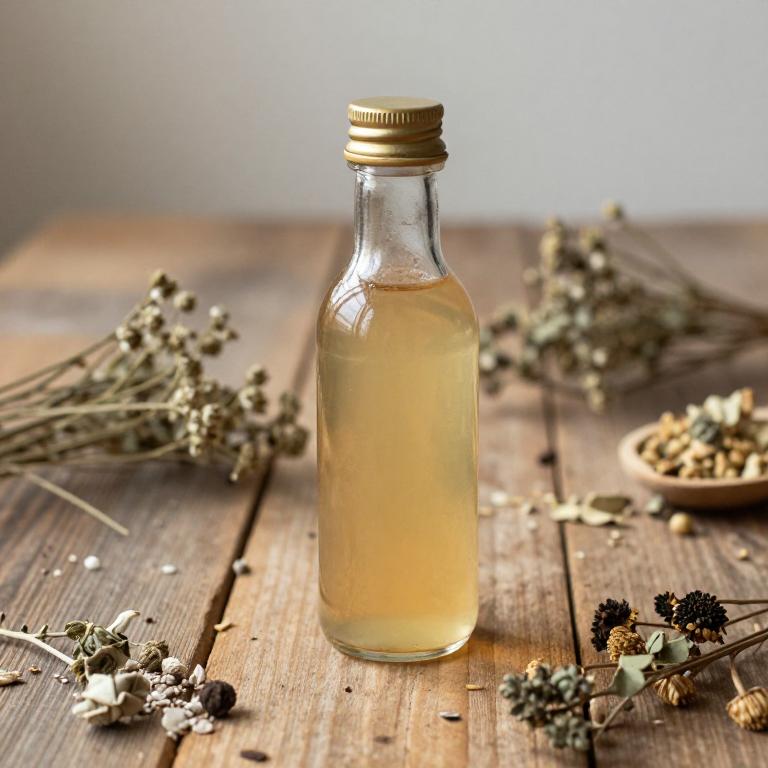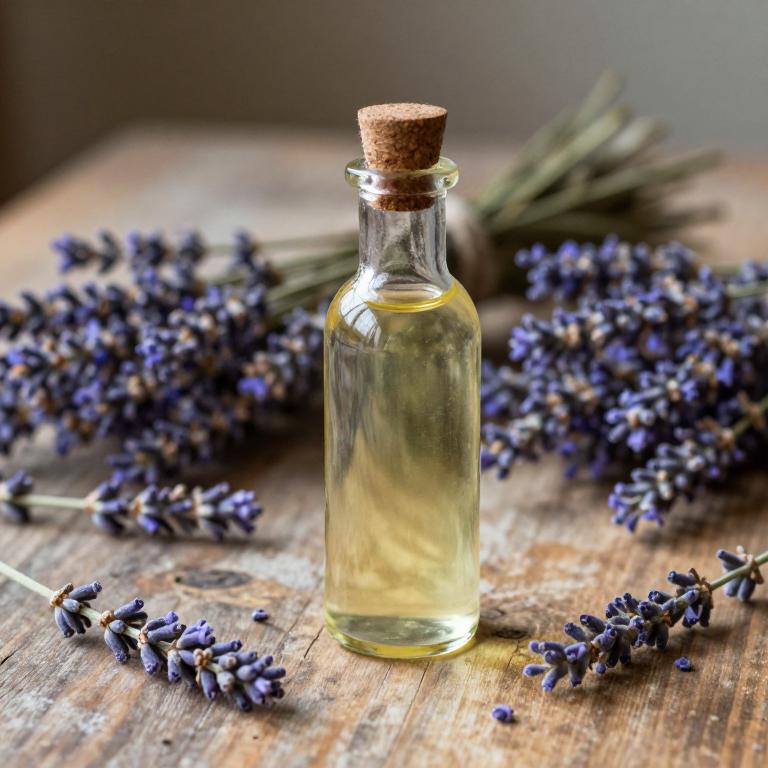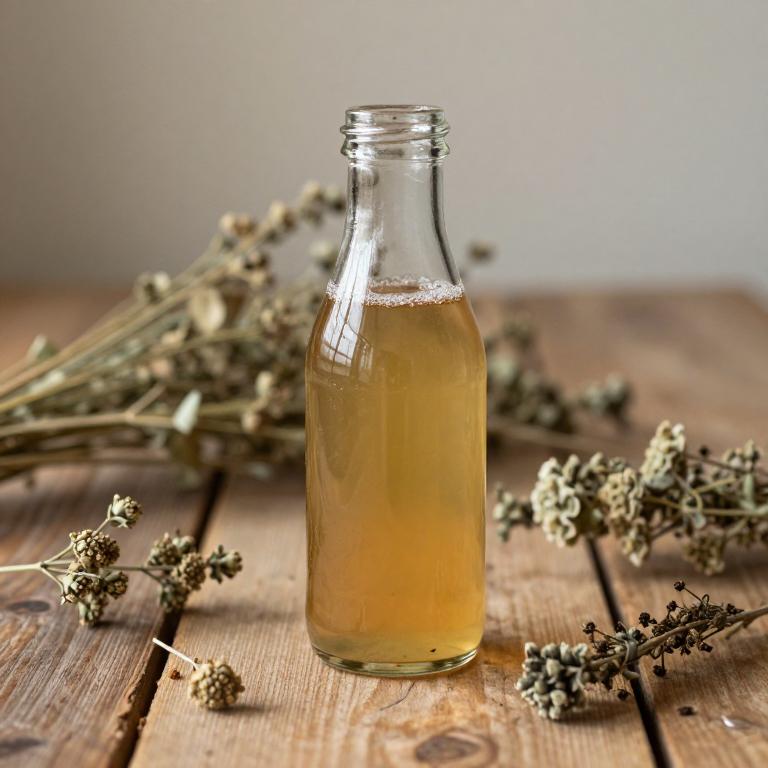10 Best Herbal Juices For Dry Skin

Herbal juices can be a natural and effective way to nourish and hydrate dry skin by providing essential vitamins, antioxidants, and minerals that promote skin health.
Ingredients like aloe vera, cucumber, and parsley are commonly used in herbal juices for their soothing, hydrating, and detoxifying properties. These juices can help improve skin texture, reduce flakiness, and enhance overall skin radiance when consumed regularly as part of a balanced diet. Additionally, herbal juices can support internal hydration, which is crucial for maintaining a healthy skin barrier.
For best results, it's important to choose fresh, organic ingredients and consult with a healthcare professional if you have any underlying health conditions.
Table of Contents
- 1. Aloe vera (Aloe barbadensis)
- 2. Stinging nettle (Urtica dioica)
- 3. Centella (Centella asiatica)
- 4. Blessed thistle (Cnicus benedictus)
- 5. Thistle (Silybum marianum)
- 6. Rosemary (Rosmarinus officinalis)
- 7. English lavender (Lavandula angustifolia)
- 8. Field horsetail (Equisetum arvense)
- 9. St. john's wort (Hypericum perforatum)
- 10. Chaste tree (Vitex agnus-castus)
1. Aloe vera (Aloe barbadensis)

Aloe barbadensis, commonly known as aloe vera, is a powerful herbal plant known for its soothing and hydrating properties, making it highly beneficial for dry skin.
Its gel contains essential nutrients, vitamins, and minerals that help restore moisture and improve the skin's overall texture. Aloe vera juice, derived directly from the plant's leaves, can be applied topically or consumed internally to enhance skin health from within. This natural remedy is gentle enough for sensitive skin and can help reduce redness, inflammation, and irritation.
Incorporating aloe barbadensis herbal juice into a skincare routine can provide long-lasting relief and nourishment for dry, flaky skin.
2. Stinging nettle (Urtica dioica)

Urtica dioica, commonly known as stinging nettle, is a nutrient-rich plant that has been used for centuries in traditional medicine.
Its herbal juices, extracted from fresh or dried leaves, are particularly beneficial for dry skin due to their high content of vitamins, minerals, and antioxidants. These juices can help moisturize and nourish the skin, reducing dryness and improving overall skin texture. When applied topically, stinging nettle juice can soothe irritation and promote skin regeneration.
However, it is important to dilute the juice with water or a carrier oil to avoid skin irritation, as the plant contains compounds that can cause a stinging sensation.
3. Centella (Centella asiatica)

Centella asiatica, also known as gotu kola, is a powerful herbal plant widely used in traditional medicine for its skin-repairing properties.
When incorporated into herbal juices, it provides essential nutrients and antioxidants that help nourish and hydrate dry skin. These juices can improve skin elasticity and reduce the appearance of dryness by promoting collagen production and enhancing moisture retention. Regular consumption of centella asiatica juice may also support overall skin health and reduce inflammation.
As a natural remedy, it offers a gentle and effective way to address dryness while maintaining a balanced and holistic approach to skincare.
4. Blessed thistle (Cnicus benedictus)

Cnicus benedictus, commonly known as St. Benedict's thorn, is a flowering plant that has been traditionally used in herbal remedies for its potential skin-soothing properties.
When prepared as a herbal juice, it is believed to help alleviate dry skin by promoting hydration and reducing inflammation. The juice is often made by blending fresh leaves with water or other mild liquids, ensuring the beneficial compounds are easily absorbed by the skin. Its anti-inflammatory and astringent qualities may help to restore the skin's natural moisture barrier.
While more research is needed to confirm its effectiveness, many people use Cnicus benedictus herbal juice as a natural remedy for dry and sensitive skin.
5. Thistle (Silybum marianum)

Silybum marianum, also known as milk thistle, is a herbal plant that has been traditionally used for its potential skin benefits.
Its active compound, silymarin, is believed to have antioxidant and anti-inflammatory properties that may help improve skin health. When consumed as a juice, silybum marianum can support overall skin hydration and may help alleviate dryness by promoting cellular repair and protection against environmental stressors. However, it is important to note that while some studies suggest potential benefits, more research is needed to confirm its efficacy for dry skin specifically.
As with any herbal supplement, it is advisable to consult with a healthcare professional before incorporating it into your skincare routine.
6. Rosemary (Rosmarinus officinalis)

Rosmarinus officinalis, commonly known as rosemary, is a versatile herb that offers numerous benefits for dry skin when used in herbal juices.
These juices are rich in antioxidants, anti-inflammatory compounds, and essential oils that help to nourish and hydrate the skin. The aromatic compounds in rosemary juice can improve blood circulation, which promotes skin renewal and enhances overall skin texture. When applied topically, rosemary herbal juice can help reduce dryness, flakiness, and redness, making it an excellent natural remedy for sensitive or dry skin types.
Regular use of rosemary herbal juice can leave the skin feeling soft, refreshed, and more resilient against environmental stressors.
7. English lavender (Lavandula angustifolia)

Lavandula angustifolia, commonly known as English lavender, is often used in herbal juices for its soothing and nourishing properties.
These juices are particularly beneficial for dry skin due to their high content of antioxidants and anti-inflammatory compounds. The calming aroma of lavender also helps to reduce stress, which can exacerbate skin dryness. When consumed regularly, lavender-based herbal juices can promote skin hydration and improve overall skin texture.
Additionally, they may support the body’s natural healing processes, making them a valuable addition to a skincare routine.
8. Field horsetail (Equisetum arvense)

Equisetum arvense, commonly known as field horsetail, is a rich source of silica and has been traditionally used in herbal remedies for its skin-repairing properties.
When prepared as a herbal juice, it can help improve the texture and hydration of dry skin by promoting the production of collagen and enhancing skin elasticity. The high concentration of antioxidants in horsetail juice also helps protect the skin from environmental stressors and oxidative damage. However, it is important to use it in moderation, as excessive consumption may lead to gastrointestinal discomfort.
Overall, equisetum arvense herbal juice can be a beneficial addition to a skincare regimen for those seeking natural remedies for dry, rough skin.
9. St. john's wort (Hypericum perforatum)

Hypericum perforatum, commonly known as St. John's Wort, is a herbal plant that has been traditionally used for its potential skin-healing properties.
When prepared as a herbal juice, it may offer nourishment and hydration to dry skin due to its high content of antioxidants and essential oils. The juice is believed to help soothe irritation and promote a healthy skin barrier, making it a popular choice in natural skincare routines. However, it is important to note that individuals should consult with a healthcare professional before using St. John's Wort, as it can interact with certain medications.
Despite its benefits, the effectiveness of hypericum perforatum herbal juice for dry skin may vary, and it should be used as a complementary rather than a sole treatment.
10. Chaste tree (Vitex agnus-castus)

Vitex agnus-castus, commonly known as chaste tree, is a herbal remedy often used in the form of juice to support skin health, particularly for individuals with dry skin.
This herb is believed to have hormonal balancing properties that may help improve skin hydration and elasticity. When consumed as a juice, vitex agnus-castus can support the body's natural processes, potentially leading to a more balanced and nourished complexion. It is often combined with other skin-supporting herbs like nettle or dandelion to enhance its benefits.
However, it is important to consult with a healthcare professional before incorporating vitex agnus-castus into your routine, especially if you have existing health conditions or are taking medications.